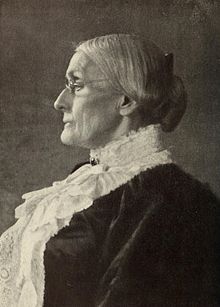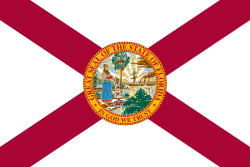Susan B. Anthony Day
| Susan B. Anthony Day | |
|---|---|
| File:Susan Brownell Anthony older years.png Susan B. Anthony | |
| Observed by | (1) United States Florida legal holiday, state offices open (2) United States California and Wisconsin educational observance, schools open with related instructions |
| Type | Florida legal holiday California and Wisconsin educational observances |
| Date | February 15 |
| Next time | February 15, 2025 |
| Frequency | annual |
Susan B. Anthony Day is a commemorative holiday to celebrate the birth of Susan B. Anthony and women's suffrage in the United States. The holiday is February 15—Anthony's birthday.[1]
History
The idea of honoring Susan B. Anthony with a holiday has only been around since 2011 when Representative Carolyn Maloney introduced the Susan B. Anthony Birthday Act, H.R.#655.[2] Today, only the U.S. state of Florida has the holiday enacted with state offices closed. In the state of Wisconsin, Susan B. Anthony Day is also an established state holiday, enacted into law April 15, 1976, from the 1975 Laws of Wisconsin, Chapter 307, section 20.[3][4] In West Virginia, this day is celebrated on Election Day on even years.[5] This holiday is not celebrated at a national level. In 1985, The Seattle Times reported on a campaign to establish the holiday as one celebrated nationally.[6] (Other holidays that are not commemorated on an official federal level in the U.S. but widely observed are St. Patrick's Day and Arbor Day.) [7] The U.S. state of California has also made this day a legal holiday as of 2014.[8] In 2004, New York governor George Pataki signed legislation that made this a holiday in that state.[9]
On February 11, 2011, Representative Carolyn Maloney of New York introduced the "Susan B. Anthony Birthday Act" (H.R. #655) to the 112th session of Congress to honor the birthday as a U.S. national holiday on the third Monday of February.[10][11] The bill was not enacted and its current status is "dead".[12]
Observances by state
| State | Current local observances |
|---|---|
| California | Declared a holiday for schools to honor in community services on February 15. Schools remain open.[13] |
| Florida | Legislated as a legal holiday on February 15. Observances moved if day falls on a weekend.[14] |
| New York | Holiday is observed on February 15.[15] |
| West Virginia | Holiday is observed on Election Day[16] |
| Wisconsin | Holiday is listed as an observance on February 15.[17] |
Origins

Anthony's history of Woman's Suffrage begins in 1852. At the age of 32, Susan B. Anthony attended her first woman’s rights convention in Syracuse, where she declared “that the right which woman need above every other, the one, the one indeed which would secure to her all the others, was the right of suffrage.”By the end of the Civil War," according to historian Ann D. Gordon, "Susan B. Anthony occupied new social and political territory. She was emerging on the national scene as a female leader, something new in American history, and she did so as a single woman in a culture that perceived the spinster as anomalous and unguarded ... By the 1880s, she was among the senior political figures in the United States."[18] Over Anthony's objections, leaders of the movement agreed to suspend women's rights activities during the Civil War in order to focus on the abolition of slavery.[19] In 1863 Anthony and Stanton organized the Women's Loyal National League, the first national women's political organization in the U.S.[20] It collected nearly 400,000 signatures on petitions to abolish slavery in the largest petition drive in the nation's history up to that time.[21]

Susan B. Anthony was one of two major movements fighting for women's suffrage. Women's suffrage in the United States, the legal right of women to vote in that country, was established over the course of several decades, first in various states and localities, sometimes on a limited basis, and then nationally in 1920 with the passage of the Nineteenth Amendment, which was first introduced in Congress in 1878 by Senator Aaron A. Sargent and enacted forty-one years later, in 1919. Congress approved the amendment and submitted it to the states for ratification. It was ratified by the requisite number of states a year later, with Tennessee's ratification being the final vote needed to add the amendment to the Constitution. In Leser v. Garnett (1922), the Supreme Court rejected claims that the amendment was unconstitutionally adopted.
See also

Other holidays honoring women
- International Women's Day, which is on March 8
- Women's Equality Day
- Rosa Parks Day
- Harriet Tubman Day
- Helen Keller Day
Other civil rights holidays
References
- ^ Holly Matthews. "Susan B. Anthony Day". TeacherLINK @ Utah State University. Retrieved 29 March 2010.
- ^ "Susan B. Anthony Birthday Act".
- ^ Wisconsin Public School Observance Days
- ^ Florida Legal Holidays
- ^ West Virginia Legislature
- ^ "Making the calendar".
- ^ Martin Luther King Jr. - Creating a Day, retrieved 16 January 2012
- ^ "EDUCATION CODE SECTION 37220-37223".
- ^ "Susan B. Anthony".
- ^ "H.R. 655 (112th): Susan B. Anthony Birthday Act".
- ^ "Susan B. Anthony Birthday Act".
- ^ "H.R. 655: Susan B. Anthony Birthday Act".
- ^ "Education Code: section 32770-32773".
- ^ "The Florida Statutes: 683.01 Legal holidays".
- ^ "Susan B. Anthony's Birthday in the United States".
- ^ "Susan B. Anthony Day".
- ^ "Susan B. Anthony Day".
- ^ Gordon, Ann D., "Knowing Susan B. Anthony: The Stories We Tell of a Life", in Ridarsky, Christine L. and Huth, Mary M., editors (2012). Susan B. Anthony and the Struggle for Equal Rights. Rochester, NY: University of Rochester Press. pp. 202, 204; ISBN 978-1-58046-425-3
- ^ McMillen (2008), p. 149
- ^ Judith E. Harper. "Biography". Not for Ourselves Alone: The Story of Elizabeth Cady Stanton and Susan B. Anthony. PBS (Public Broadcasting System). Retrieved June 11, 2013.
- ^ Venet (1991), p. 148
